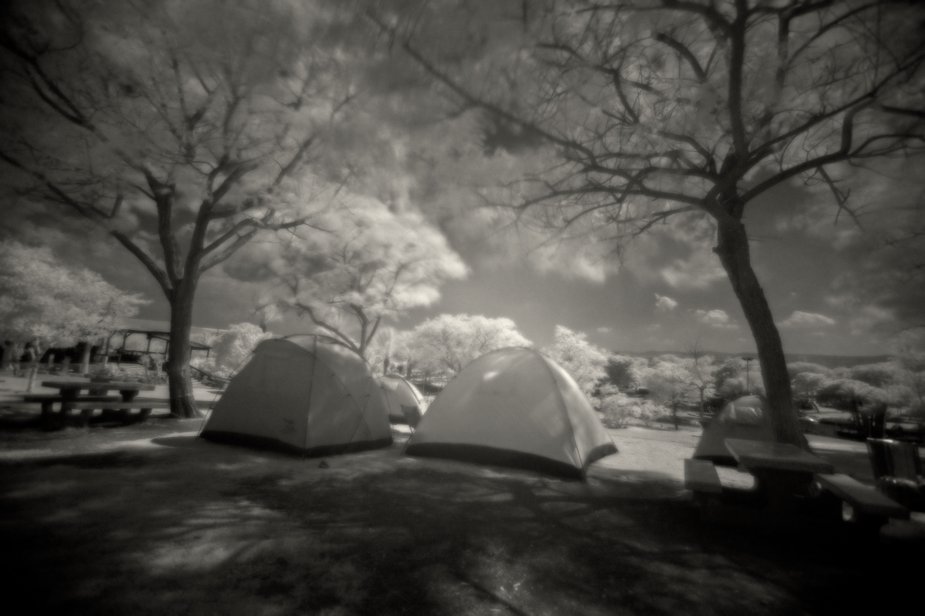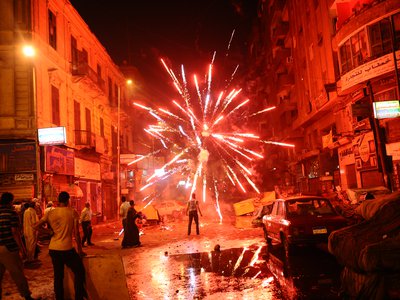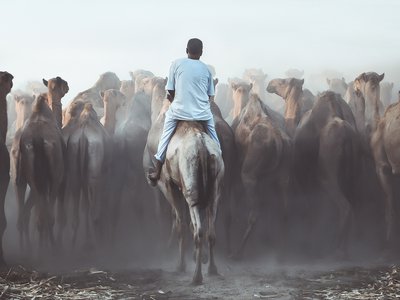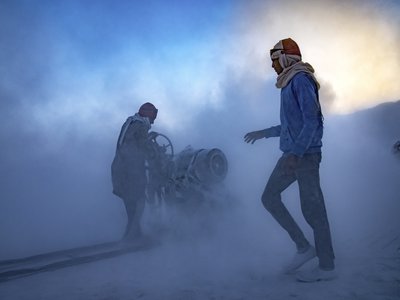Ammar Alqamash:
Tell us about the beginning of your journey in photography, and how did the artistic movement originate in Qatar?
Khalifa Al Obaidly:
My start with photography was at a young age when my father took me to the Larry Electronics store in Souq Waqif to buy a Kodak 110 camera after passing the fifth- grade exams. From there, I took photography as a hobby until I enrolled in Qatar University to study marine biology. I met the university photographer Mustafa Omeira there and my journey in photography began. This journey started when I passed in front of an advertisement poster for a photography workshop in the student activities building at the university. I joined the workshop, and within it, I had to visit a darkroom and learn to develop films. I remember how I fell in love with the place at first glance. The idea of being there in the darkroom where all the university’s events pictures are produced excited me. I found myself enjoying the dim lighting, the smell of chemicals, and the calmness of the place. After that session, I volunteered to work in the darkroom as an assistant to the university photographer, Mustafa Omeira, so I can learn film development and the photography basics. One day the university needed the photographer, Mustafa Omeira, to cover an event while he was in the midst of developing some films. I proposed to develop the remaining films and then wrote a simple guide explaining the details of the development process. On the following day, the photographer praised the work I had done and rewarded me. I learned a lot from this unique experience which led me to make a career out of photography. He has always shared all the knowledge he had about photography and film development while I continued to work with him during my college years until I joined the Qatar Photographic Society in 1988. At that time, the association included a group of Qatari photographers, such as Ahmed Al-Khulaifi, Abdulrahman Obaidan, Hussein Al-Jaber, Muhammad Al-Mannai, and others. We used to meet weekly, and in every session, two different photographers present a set of their work to share knowledge and views. The experience and learning technique were different from before and so this was a new chapter in my journey with photography. After that, I met Sheikh Saoud Al Thani, who, in my option, is one of the founders of the artistic movement in its current form in Qatar. Meeting Sheikh Saoud was a huge step for me in the world of art and photography, as his accompaniment allowed me to meet the best international photographers at that time and draw from their experiences and knowledge through our joint meetings and trips.
Ammar Alqamash:
Tell us about photography in Qatar during that period?
Khalifa Al Obaidly:
There was a handful of photographers in Qatar back then. The photographers’ community included a small group of artists each have their own unique style, such that by only seeing their work once, anyone can tell the work belongs to which photographer. One of the great advantages of this small group is the rapid circulation of knowledge and experience between them. During that period, I worked under the leadership of Sheikh Saoud Al Thani, one of the biggest supporters of various artistic movements in Qatar, in the National Council for Culture and Arts, which served as the Ministry of Culture and Arts in our present time. By virtue of my work in the National Council for Culture and Arts, I supported local photographers and allocated greater support for photographers to hold art exhibitions. We also established a photography competition parallel to the Doha Cultural Festival, which many consider ahead of its time.
Sheikha Sara Al-Thani:
I remember the period that Mr. Khalifa Al Obaidly is talking about despite how young I was. In spite of the huge ambition of the Doha Cultural Festival and its great goals, my father was being blamed and criticised by society for holding some of these cultural events and futuristic art exhibitions. At that time, society did not accept any new and out-of-the-ordinary events or activities, to the extent that some described the festival’s activities as extraneous to our customs and traditions. However, the confidence and support of His Highness the Father Emir Hamad bin Khalifa Al Thani was the only reason for the festival to continue regardless of the objections, which signaled a significant move in the Qatari cultural scene.
Khalifa Al Obaidly:
Everyone in the region was amazed at the quality and fame of the Doha Cultural Festival, that some critics described it as a magical festival. During the festival days, Doha is graced with various exhibitions and cultural events all over the city. Significant artistic figures have participated in the different editions of the festival, such as the late famous Italian opera singer Pavarotti, the great singer and vocalist Fairouz, Leon Ricci, The Fire of Anatolia group, the famous opera Aida, and other dignitaries and international artistic groups. This festival reflects the great aspirations of the State of Qatar and those in charge of it, headed by the late Sheikh Saoud Al Thani. The success of this festival had a tremendous cultural impact on the population of Qatar by giving them a better understanding of the concept of culture and the artistic movement in the country.
Sheikh Saoud was always keen to support artists in general and photographers in particular. Under his sponsorship, we organised a daily competition for photographers in Qatar to capture the Doha Cultural Festival. Most photographers in Qatar compete to present the photos that best describe the festival and win daily prizes. This competition was one of the most impactful initiatives of Sheikh Saoud as it contributed to enhancing the opportunities of local photographers in Qatar and giving them great potential and financial motive. Other than the festival, Sheikh Saoud once invited His Highness the Father Emir Hamad bin Khalifa Al Thani to the Qatari Photographic Society. His Highness, the Father Emir, increased the support and authorities granted to the society, which greatly recognised and motivated the local talents.
Ammar Alqamash:
Tell us about the establishment of the Sheikh Saoud Al Thani competition and how it started?
Sheikha Sara Al-Thani:
The competition began with the aim of supporting local photographers in Qatar. One of the initiatives of my father, Sheikh Saoud Al Thani, was to promote photography in Qatar, support local talents, and create a dedicated space for the evolution of the artistic community in Qatar.
Khalifa Al Obaidly:
The idea of the competition arose in 1998 when Sheikh Saoud asked for my suggestions for ways to support photographers in Qatar. One of the proposals was to establish an annual photography competition and award generous cash prizes to the winners. My personal suggestion was to allocate cash prizes only. Still, the Sheikh, with his vision, suggested cooperating with the well-known German camera company Leica to make an exclusive edition of their famous cameras and grant them to the first place winner every year. The rest of the winners would receive generous financial prizes. Leica has already agreed to make fifteen of its exclusive edition cameras signed by the late Sheikh Saoud Al Thani. The competition was limited to the photographers in Qatar in the first five years. The vision is to open the way for photographers in the Gulf Countries to participate in the next five years, and in the last five years, all photographers from around the world can participate. In the first five years of the competition, when I headed it up, the competition topics revolved around local heritage, such as traditional costumes and jewelry, Qatari nature, and others. We were working in harmony with the competition to create a rich archive for the State of Qatar, adapted from the participating photos. After the first five years, I resigned from running the competition and suggested transferring the competition to become under the Qatar Photographic Society.
Sheikha Sara Al-Thani:
The competition may have lost part of its special value with the changes introduced then, such as the increase in the number of winners. Still, despite that, the competition preserved its international reputation and legacy; hence, photographers around the world continued to participate in it.




